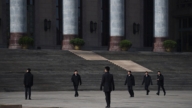【新唐人2013年04月04日訊】香港媒體報導說,中國大陸各地方出臺的「新國五條」細則不痛不癢,是因為各界包括利益集團,都以樓價是否會受遏止,來衡量習、李新中央的政治能量,令各個利益集團更加糾纏,並影響習、李改革步伐。因此習、李遏制樓價,預料不會手軟。
香港《經濟日報》報導,中共中央能否有效遏樓價,被各界作為透視習、李施政能量的指標。
然而,雖然中央雷厲風行在兩會前祭出「新國五條」,要求各地方上個月底出臺政策細則,但各地方不但觀望拖延到最後一刻,而且除了天子腳下的北京外,其餘都有敷衍了事之態。例如深圳、大連等不少地方表明,新建住房樓價增幅,須低於人均可支配收入實際增幅,換句話說,就是樓價仍可再漲;而上海、濟南等地則沒有列出限購措施;武漢、合肥等,更提也不提20%轉讓所得稅。
「中央民族大學」哲學和宗教學系教授趙士林指出,中國大陸地方和中央之間,在樓市房價上,肯定將展開激烈博弈。為甚麼呢?趙士林說,這要追溯到朱鎔基時代,當時制定了地方財政和中央財政的「分稅政策」。
中央民族大學哲學和宗教學系教授趙士林:「地方財政來源主要靠土地財政,如果地方房地產受到遏制的話,土地財政就沒有了。地方政府的一大財源就消失了。所以說,對他們來講是至關重要的,因此想盡辦法要和中央博弈。所以說,目前這個政策的問題就在於,他在出臺這個政策的時候沒有想到,中國這個財稅結構,中央和地方的利益分配是不是合理?」
那麼要如何從根本上解決房價飆升的問題呢?趙士林認為,財稅體制要理順,中央和地方的利益分配要合理,經濟結構要轉型,不能依靠土地財政。根本解決之道就是「土地所有制」改革。
趙士林:「土地要允許商業化,不能把在政府手裡邊,成為財政的一個重要來源,這是推高房價的重要原因。所以造成嚴重的社會問題。因此要對所有制進行改革,土地你要放開,要允許農民擁有土地的轉讓權,甚至買賣權利。農村的收入問題,農村的改革問題,農民的權益問題,就都能保障了,很多強徵、強拆的問題也都解決了。」
至於地方政府財政的出路問題,趙士林認為,應該和中央協調起來解決,一方面,要使財政透明化,另一方面,要以硬性約束遏制「三公消費」,降低行政成本。
趙士林說,英國、美國、日本的行政成本,差不多是6%到9%,最多是10%,而中國的行政成本是20%幾,甚至達到28%。
那麼,在目前的這場地方和中央的博弈當中,誰將取勝呢?
趙士林:「肯定中央要取勝。在我們中國的政治體制,中央還是強勢政府,大權在中央手裡,不聽話可以撤掉你。當然沒有這麼簡單,很多利益集團在博弈,在掣肘。不外乎兩塊,一塊是國企、央企壟斷;一塊是官員的權益、官員的特定利益。這兩塊肯定是最難動的。」
趙士林又指出,中央的「國五條」雖然短時間內能解決房價的一些問題,但是因為不符合市場規律,所以可能造成更深層問題。比如,中央和地方的關係更加緊張,地方財政出現危機,未來房價伺機反彈報復性瘋漲,形成一種惡性循環。
不過,趙士林認為,土地所有制涉及政治體制,牽涉國家制度問題,阻力更大。
《經濟日報》還表示,北京當局日前出臺「國五條」細則,明令禁止單身人士在京購買第二套房,原意是要堵塞利用「假離婚」購房的漏洞,但又有可能引爆「假結婚」潮,民眾利用假婚姻,博取購房資格。
輿論揶揄官方的樓控政策只是頭痛醫頭,「調控」樓市變成了「調戲」婚姻。
採訪編輯/秦雪 後製/葛雷
China’s Local Governments Resist Property Prices Curbing
Hong Kong media reported that the newly introduced policy
of national five rules in Mainland China is rather superficial.
People from all walks of life, including interests groups,
will judge Xi-Li’s political skills by property prices curbing.
The various interests groups are intertwined,
which affects the pace of Xi-Li’s reform.
Therefore, they cannot afford to be soft
in dealing with this issue.
Hong Kong Economic Times reported, whether China’s
Central Committee can effectively curb property prices will be an indicator of Xi-Li’s political capability.
The policy was introduced late last month,
and it requires local governments to put it into practice.
Yet, local governments take the “wait and see” approach,
and delay actions until the last minute; except Beijing.
In cities like Shenzhen and Dalian officials said,
increase of housing prices must be kept below the increase of disposable income per capita.
In other words they say,
there is still a room for the prices to go up.
Shanghai and Jinan show no taking of purchase measures;
In Wuhan and Hefei the 20% of property transfer tax is not even mentioned.
Zhao Shilin, professor of Philosophy and Religion points out,
controlling property prices will be a fierce game between local and central governments.
Even in Zhu Rongji era, there was a tax policy
regarding the local and the central finance.
Prof. Zhao Shilin: “Local revenues are mainly land related.
If you curb the local real estate prices, local revenues will go.
So, this is crucial for the local governments.
They have to fight.
The problem is that no one thought of the revenue sharing
before this policy was set up.
Is this tax structure fair for both,
the local and the central governments?”
Zhao Shilin believes, they need to straighten out
the revenue’ and the taxation’ systems.
There must be a reasonable central and local distribution
of benefits, and economic structure transformation.
One cannot rely only on revenues from the land.
The fundamental solution is the reform of land ownership.
Zhao Shilin: ”The land needs to be commercialized. It can’t
be in the government’s hands and be a key revenue source.
That is a serious social problem, and a reason
for the high housing prices. Everything needs a reform.
Once you let go of the land, peasants will own the land.
They will have the rights to transfer, buy and sell their land.
If rural income improves,
rural reform and farmers’ interests are protected.
The issues of forced appropriation of land,
and of demolition will be resolved.”
Zhao Shilin says, the revenue issue for local governments
needs to be resolved jointly by both sides.
In addition, finances need transparency; using public funds
for traveling, dining, and transportation should be abolished.
Zhao comments, in the UK, the US, and Japan,
administrative costs amount to 6-10% of total revenues.
Yet in China, it accounts for more than 20%,
and can go as high as 28%.
In the battle of interests between local and central government,
Who will be the winner?
Prof. Zhao: “Of course, the winner is the central government.
It has the power to remove you. It’s quite a complex game.
Many interests groups are competing
and interfering with each other.
The hardest things to change are state-owned enterprises’
monopoly and the officials’ power and benefits.”
Zhao Shilin also points out that the new policy can resolve
some problems, but it does not comply with the market laws.
It may create deeper problems. For example, it may strain
the relationship between central and local governments, deepen local revenue crisis, and affect the future prices.
Thus, it can form a vicious cycle.
Zhao Shilin believes that the resistance will be even stronger
because land ownership involves the political system and affects the whole country.
The Economic Times also said that Beijing authorities
have recently introduced five new property ownership rules.
These rules ban a single person from buying a second house,
in order to plug the loophole of fake divorces.
However, that can also create sham marriages
for people who want to buy a house.
The public opinion says, regulations of the housing market
can eliminate symptoms but not cure the disease.
Thus this type of controlling the housing market
seems to be more of a teaser for marriages.

























